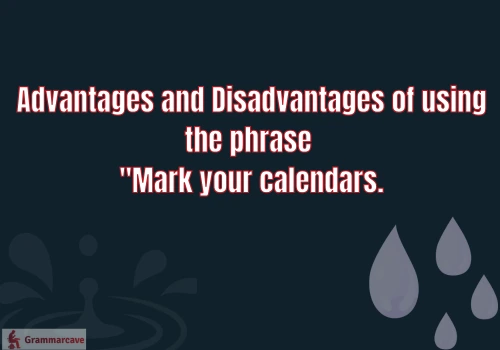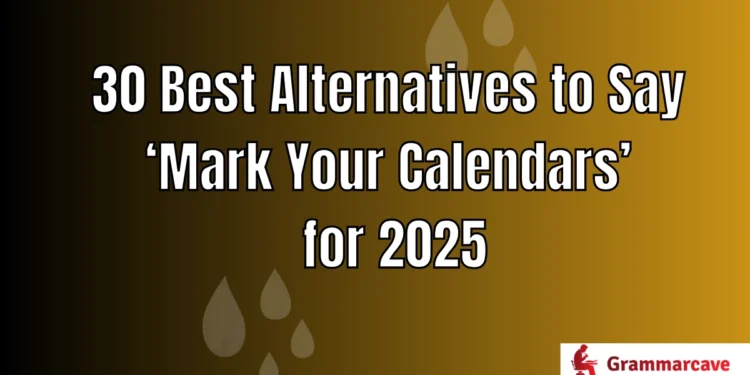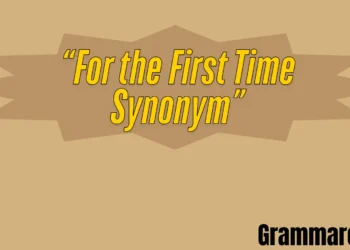Marking the calendar” serves as a dull phrase that can stands out and can transform into absolutely captivating and unforgettable if told differently. From informing to reminder to inviting someone for an event eying is exclusive and super special, every phrase delivered can shape what is to come. The thoughtful expression goes beyond polite informing; it builds relationships, intrigues, and makes an audience important.
Instead of cliches, locate more fitting phrases that fit your tone and objective. When crafted skilfully, even mundane messages become delightful surprises that people eagerly await. The balance is how warm versus how clear and how personable versus how professional to be.
In this post, we show you how to tailor your communication, whether through emails, social media touchpoints, or real-life interactions.
What Does “Mark Your Calendars” Mean?
“Mark your calendars” is an appeal to prioritise a significant occasion rather than merely a reminder. This sentence turns a straightforward notification into a call to action, encouraging your audience to take note of an impending deadline, event, or special occasion—either digitally or physically. In contrast to passive expressions like “keep tuned,” it generates interest immediately by suggesting that the date is important enough to remember.
The term originated in physical calendar marking customs and is still applicable in the digital age. It fulfils two essential functions, whether it is utilised for community meetings, weddings, product launches, or business events:
1. Memory Aid: Helps ensure your event doesn’t get lost in busy schedules
2. Value Signaling: Subtly communicates that this occasion is worth anticipating
Perfect for professional and personal contexts, the phrase works equally well in email subject lines, social media posts, and verbal announcements. Its versatility lies in balancing urgency with excitement—it’s direct enough for formal notices yet energetic enough for celebratory save-the-dates.
Is it a Polite/Professional way to say “Mark Your Calendars”?
‘”Mark your calendars’ works fine for casual reminders among colleagues, but you might want something more polished when writing to clients, executives, or in formal communications. After all, tone matters—especially when you want to sound professional yet approachable.
Instead, try warm phrases but keep things crisp and respectful. If you choose the right outfit, you won’t wear flip-flops to a board meeting, but you don’t need to be overly stiff. The goal is clarity with a touch of professionalism so your message lands smoothly without sounding robotic.
Advantages and Disadvantages of using the phrase “Mark your calendars.”

Advantages
1. Clear & Direct – Quickly conveys urgency and ensures the date is noted.
2. Commonly Understood – Most people recognize the phrase, reducing confusion.
3. Friendly Tone – Works well for internal teams or casual workplace reminders.
4. Action-Oriented – Encourages people to take immediate notice.
5. Versatile – Fits emails, announcements, and verbal reminders.
Disadvantages
1. Too Informal for Formal Settings – This may seem unprofessional in client emails or executive communications.
2. Can Feel Overused– Lacks originality if used frequently.
3. May Sound Commanding—Without softening the words (“please”), it can come across as abrupt.
4. Not Ideal for High-Stakes Events– Important deadlines or meetings may need a more polished phrase.
5. Cultural Differences – Some global audiences may prefer more formal or neutral language.
1. Catalog the date
Definition: To systematically classify the date.
Meaning: Uses library science terminology.
Scenario Example: “Catalog the date under both ’employee milestones’ and ‘company events.'”
Explanation: Treats dates as entries in an organized system, often with multiple classification tags. Focuses on retrieval and cross-referencing.
Best Use: Knowledge management systems.
Worst Use: Simple personal reminders.
Tone: Academic, taxonomic.
2. Reserve the day
Definition: To set aside a specific day for an event, implying exclusivity (no other plans).
Meaning: Stronger than “save the date”; suggests the day should be dedicated entirely to the event.
Scenario Example: A CEO tells their team, “Reserve the day for our annual strategy summit—no other meetings allowed.”
Explanation: Used in professional or high-commitment contexts.
Best Use: Critical work events or exclusive gatherings.
Worst Use: Informal or flexible events.
Tone: Authoritative, formal.
3. Archive the day
Definition: To preserve the data in long-term storage.
Meaning: Treats dates as historical artefacts.
Scenario Example: “The museum will archive the day the treaty was signed.”
Explanation: Used when data needs preservation for future reference rather than immediate use. Implies careful categorisation and storage.
Best Use: Cultural preservation, institutional memory.
Worst Use: Active planning.
Tone: Curatorial, preservationist.
4. Block the day
Definition: To intentionally mark a day as unavailable for other activities.
Meaning: Direct and practical; often used in workplaces to clear schedules.
Scenario Example: A manager says, “Block the day for the quarterly audit—no PTO requests.”
Explanation: Emphasizes priority and avoids conflicts.
Best Use: Mandatory work events or deadlines.
Worst Use: Social events (can sound rigid).
Tone: Direct, no-nonsense.
5. Note the date
Definition: A gentle reminder to remember a date.
Meaning: Less urgent; assumes the recipient will add it to their calendar.
Scenario Example: A school newsletter states, “Note the date: Parent-teacher conferences on March 10th.”
Explanation: Neutral and informational.
Best Use: Low-pressure reminders (school events, deadlines).
Worst Use: Time-sensitive or critical events.
Tone: Neutral, friendly.
6. Chronicle the date
Definition: To record in narrative form.
Meaning: Adds historical storytelling context.
Scenario Example: “The diary chronicles the date of the king’s coronation.”
Explanation: Elevates dates from mere markers to parts of a narrative timeline. Implies the date has storytelling significance beyond practicality.
Best Use: Histories, memoirs, legacy tracking.
Worst Use: Business scheduling.
Tone: Historical, sentimental.
7. Keep the date
Definition: A reminder to honour a previously agreed-upon date.
Meaning: Reinforces commitment; often used after the initial “save the date.”
Scenario Example: A follow-up email says, “Just a reminder to keep the date for the fundraiser!”
Explanation: Prevents forgetfulness.
Best Use: Follow-ups to earlier reminders.
Worst Use: Overuse (can sound nagging).
Tone: Encouraging, persistent.
8. Remember the day
Definition: Emotional or nostalgic call to recall a date’s significance.
Meaning: Focuses on sentiment, not just logistics.
Scenario Example: A memorial announcement: “Remember the day we honour our founder, April 12th.”
Explanation: Evokes personal or historical importance.
Best Use: Anniversaries, memorials.
Worst Use: Routine events.
Tone: Poignant, reflective.
9. Secure the day
Definition: To guarantee a date’s availability, often competitively (e.g., venues).
Meaning: Suggests scarcity or urgency.
Scenario Example: A travel ad says, “Secure the day for early-bird Black Friday deals!”
Explanation: Used in commercial or high-demand contexts.
Best Use: Sales, limited-capacity events.
Worst Use: Everyday plans.
Tone: Urgent, persuasive.
10. Index the day
Definition: To create a searchable reference point.
Meaning: Optimises for information retrieval.
Scenario Example: “Index the day by project code for report generation.”
Explanation:
A technical approach where dates become search keys in databases or filing systems. Prioritizes findability over commemoration.
Best Use: Database management, reporting systems.
Worst Use: Social calendars.
Tone: Technical, precise.
11. Highlight the date
Definition: To give a date extra visibility or importance.
Meaning: Similar to “circle,” but may imply formal documentation.
Scenario Example: A newsletter reads, “Highlight the date: Community cleanup is Saturday at 9 AM.”
Explanation: Encourages active participation.
Best Use: Public events or shared calendars.
Worst Use: Private or low-key plans.
Tone: Engaging, instructive.
12. Don’t forget
Definition: A reminder to retain a date in memory.
Meaning: Implies the date is important but easy to overlook.
Scenario Example: A spouse says, “Don’t forget—Mom’s birthday dinner is this Friday!”
Explanation: Often used for personal or sentimental dates.
Best Use: Critical personal events (anniversaries, family gatherings).
Worst Use: Professional settings (can sound patronizing).
Tone: Familiar, cautionary.
13. Jot it down
Definition: To quickly write a date informally.
Meaning: Casual and effortless; assumes minimal effort is needed.
Scenario Example: A friend says, “Jot it down—we’re meeting at the café next Tuesday.”
Explanation: For low-stakes plans where forgetting is inconsequential.
Best Use: Informal hangouts or quick reminders.
Worst Use: Formal or high-importance events.
Tone: Laid-back, friendly.
14. Keep it free
Definition: Requesting someone to avoid scheduling other events on that day.
Meaning: More casual than “reserve the day,” but equally binding.
Scenario Example: A friend texts, “Keep next Saturday free—I’m planning a surprise!”
Explanation: Builds anticipation without revealing details.
Best Use: Surprises or important personal events.
Worst Use: Professional settings (can sound vague).
Tone: Friendly, expectant.
15. File the date
Definition: To officially store the date in records.
Meaning: Treats the date as a document.
Scenario Example: “File the date with the compliance paperwork.”
Explanation:
Bureaucratic terminology where dates become part of official documentation. Implies storage for potential future reference or audit.
Best Use: Regulatory compliance, administrative records.
Worst Use: Personal scheduling.
Tone: Procedural, official.
16. Save the slot
Definition: Reserving a specific time block (not just the day).
Meaning: Precise, often used for shorter, timed events.
Scenario Example: A podcast host says, “Save the slot—we’re recording at 3 PM sharp.”
Explanation: Ideal for appointments, interviews, or webinars.
Best Use: Time-bound professional or media engagements.
Worst Use: All-day or flexible events.
Tone: Professional, precise.
17. Block the time
Definition: Explicitly marking a period as unavailable.
Meaning: Common in workplace scheduling to prevent conflicts.
Scenario Example: A manager emails, “Block the time for the client demo—no interruptions.”
Explanation: Time is treated as a tangible resource to be allocated.
Best Use: Focused work sessions or critical calls.
Worst Use: Social events (can feel transactional).
Tone: Direct, efficiency-focused.
18. Put it down
Definition: Informal instruction to record the date.
Meaning: Assumes quick, no-frills acknowledgement.
Scenario Example: A parent says, “Put it down—your dentist appointment is Tuesday at 4.”
Explanation: Colloquial and straightforward.
Best Use: Family logistics or quick plans.
Worst Use: Formal or ceremonial events.
Tone: Casual, parental.
19. Enter the date
Definition: Formal instruction to input the data into a system.
Meaning: Technical, often used with digital tools.
Scenario Example: A software prompt says, “Enter the date for your recurring billing cycle.”
Explanation: Mechanistic prioritizes accuracy over sentiment.
Best Use: Administrative tasks or software workflows.
Worst Use: Personal or emotional occasions.
Tone: Clinical, impersonal.
20. Log the day
Definition: To officially record the date in a log or record-keeping system.
Meaning: Implies documentation for future reference.
Scenario Example: A scientist notes, “Log the day of the experiment for the lab records.”
Explanation: Used in academic, medical, or legal contexts.
Best Use: Research, compliance, or archival purposes.
Worst Use: Celebratory or social events.
Tone: Methodical, bureaucratic.
21. Enter in planner
Definition: To write or input the data into a physical or digital planner
Meaning: Emphasizes the action of recording in a specific organizational tool
Scenario Example: “Don’t forget to enter our team offsite on June 15th in the planner – it’s mandatory attendance.”
Explanation: Useful for people who rely heavily on planners for organization
Best Use: Professional settings or for highly organized individuals
Worst Use: Casual reminders between friends
Tone: Practical, organized
22. Record the day
Definition: To officially document or make a note of the date
Meaning: Suggests formal record-keeping or historical significance
Scenario Example: “Please record the day of the merger signing in the corporate archives.”
Explanation: Used when preserving dates for posterity or official records
Best Use: Legal, corporate, or historical contexts
Worst Use: Informal social gatherings
Tone: Formal, archival
23. Insert the date
Definition: To add the date into a system or document
Meaning: Technical instruction for data entry
Scenario Example: “Insert the date of your last physical exam in the form field.”
Explanation: Common in digital interfaces and form completion
Best Use: Administrative or technical contexts
Worst Use: Personal or emotional occasions
Tone: Mechanical, instructional
24. Program the day
Definition: To schedule or input into a digital calendar system
Meaning: Uses programming/tech metaphor for scheduling
Scenario Example: “Program the day for our quarterly sync in everyone’s Outlook calendars.”
Explanation: Reflects digital-age scheduling practices
Best Use: Tech-savvy workplaces
Worst Use: Traditional or non-technical audiences
Tone: Modern, digital
25. Input the date
Definition: To enter the data into a system or form
Meaning: Similar to “insert” but more general
Scenario Example: “Input the date of birth in MM/DD/YYYY format.”
Explanation: Used in data collection scenarios
Best Use: Forms, applications, registrations
Worst Use: Social planning
Tone: Technical, neutral
26. Slot the day
Definition: To allocate or assign the day for a specific purpose
Meaning: Treats time as compartmentalized units
Scenario Example: “Let’s slot the day after Thanksgiving for inventory review.”
Explanation: Common in business scheduling
Best Use: Project planning or resource allocation
Worst Use: Personal or flexible events
Tone: Businesslike, efficient
27. Book the slot
Definition: To reserve a specific period
Meaning: More precise than “book the date.”
Scenario Example: “We need to book the slot for the TV commercial before rates increase.”
Explanation: Used when exact timing matters
Best Use: Media, appointments, time-sensitive bookings
Worst Use: All-day events
Tone: Urgent, precise
28. Fix the date
Definition: To establish or finalize the date definitively
Meaning: Suggests removing uncertainty
Scenario Example: “After months of planning, we’ve finally fixed the date for the product launch.”
Explanation: Used when moving from tentative to firm plans
Best Use: Official announcements or long-planned events
Worst Use: Flexible or evolving schedules
Tone: Decisive, conclusive
29. Set the day
Definition: To determine and establish a specific day
Meaning: Similar to “set the date” but more general
Scenario Example: “We’ll set the day for annual reviews during next week’s meeting.”
Explanation: Used when selecting from options
Best Use: Organizational planning
Worst Use: Immediate scheduling needs
Tone: Authoritative, planning-oriented
30. Peg the date
Definition: To tentatively mark or associate with a date
Meaning: Suggests a temporary or approximate placement
Scenario Example: “Let’s peg the date for early November, but confirm after budget approval.”
Explanation: Useful for preliminary planning
Best Use: Early-stage project planning
Worst Use: Firm commitments
Tone: Provisional, flexible
Frequently Asked Questions (FAQs)
1. What are stronger alternatives?
“Clear your schedule!” (more urgent)
“This date is non-negotiable.” (strict)
2. What are softer alternatives?
“Pencil it in!” (tentative)
“Note the date.” (gentle)
3. Can I use it in a work email?
Yes! Example: *”Mark your calendars—the quarterly review is on March 15th.”
4. Is it “Mark Your Calendar” or “Calendars”?
Both work, but *”Calendars”* (plural) is more common for groups.
5. Should I use an exclamation mark?
It is optional. It adds enthusiasm (“Mark your calendars!”*) but isn’t required for formal contexts.
6. Can I shorten it to “Mark the Date”?
Yes, but it’s less common and slightly more formal.
7. How do I follow up after saying it?
Pair it with details: “Mark your calendars: Annual Gala, June 5th, 7 PM. RSVP by May 20th.”
Conclusion
The phrase “mark your calendars” refers to scheduling reminders and stands out for using friendly yet urgent language. This mark substantially contributes to the goal or purpose of the phrase in social and professional contexts because social or professional etiquette requires direct action to be observed. Unlike “mark your calendar,,” which is vague, or “clear your schedule,” which is more unilateral, “mark your calendars” perceptually sparks passive movement towards the desired direction. This suggests marking or tagging a date in such a way that capturing one’s attention will substantially increase the probability of them remembering said date. Informal and formal gatherings, meetings, or conferences mention “mark your calendars”.
When notice is wanted instead of working at the last minute, it’s effective, but the mark’s adaptability with reminders such as calendar emojis or other visuals makes it seamlessly accompany evoked heightened attention. It shows how ingrained this phrase has become, transcending generational and industry splits and setting the standard for announcing dates. Its only limitation is when used for sideshow matters, which can diminish its impact. Whether marking dates for meetings or events, “mark your calendars” is the phrase that guarantees prioritisation alongside the strongest memory retention of events. “Mark your calendars” will continue to outperform more complex expressions.








